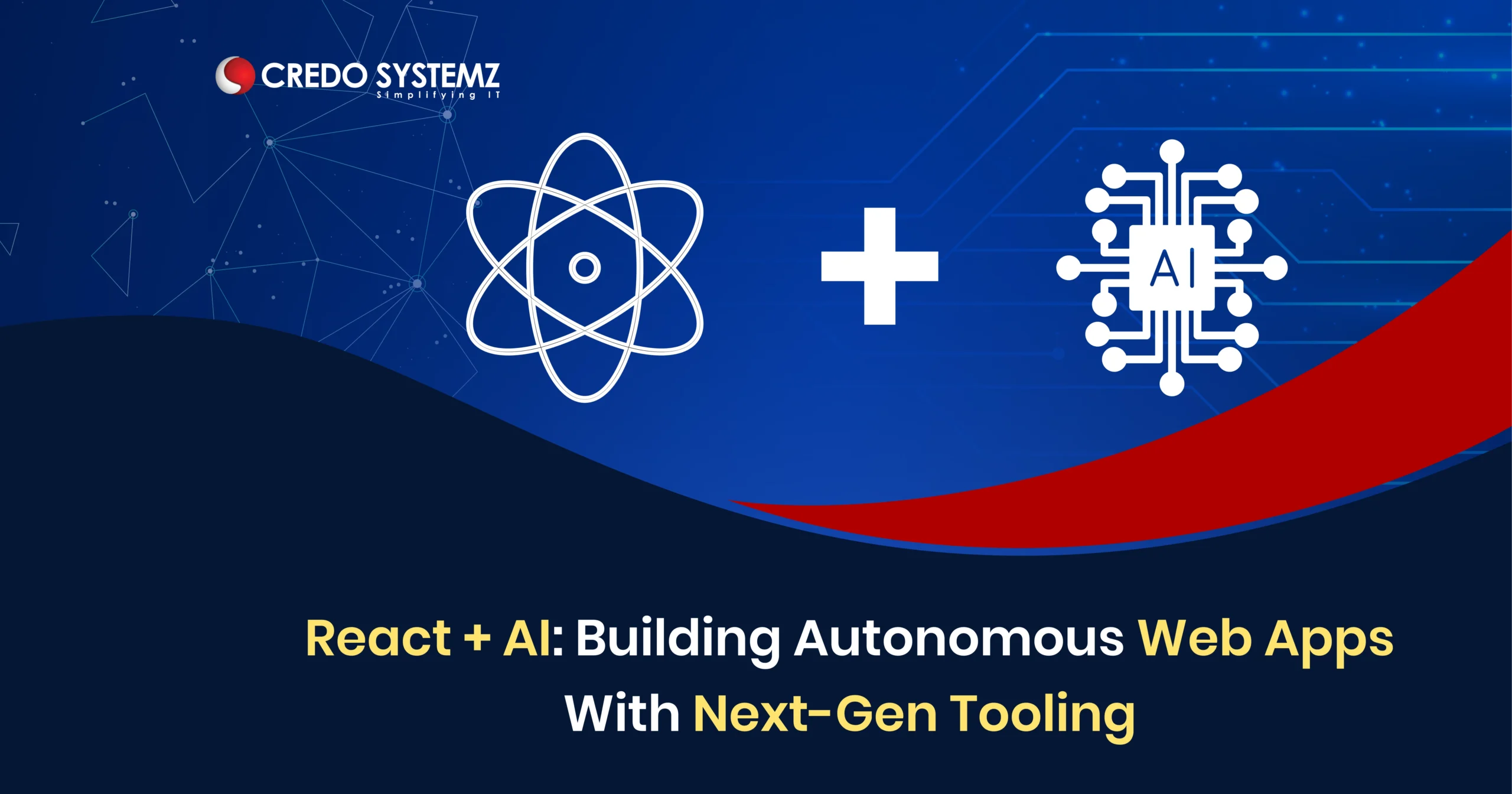
Introduction
In today’s digital world, React continues to dominate the front-end for building modern web applications. With the rapid rise of AI and agentic systems, developers are moving towards creating autonomous web apps that can think, adapt, and act on their own.
React + AI is shaping the future of software development by merging powerful UI frameworks with intelligent automation. It allows apps to make decisions, learn from users, and execute tasks independently.
React + AI
React is the go-to choice for web development because of its:
- Component-based architecture
- Strong ecosystem
- Performance and scalability
- Huge developer community
AI integration adds autonomy, personalization, and intelligence into the mix. React provides the UI foundation, while AI provides the cognitive layer.
The Rise of Autonomous Web Apps
Autonomous web apps are powered by AI agents that can:
- Understand context – through NLP, sentiment analysis, and behavioral tracking.
- Reason and plan – using LLMs and decision-making frameworks.
- Act independently – by integrating APIs, automating workflows, and executing tasks.
- Continuously learn – adapting experiences with reinforcement learning and user feedback.
Next-Gen Tooling for React + AI
The ecosystem is evolving with new frameworks and libraries that bridges React with AI capabilities:
- AI APIs & SDKs
OpenAI / Anthropic / Google Gemini APIs to integrate conversational AI and reasoning.
LangChain.js chain together multiple AI models and reasoning steps directly in React apps.
Vercel AI SDK can stream AI responses into React/Next.js components. - State & Context Management
React’s useContext and useReducer can maintain AI agent memory. Tools like Recoil can manage complex AI-driven state flows. - UI/UX Patterns for AI
Chat interfaces with real-time streaming. Adaptive dashboards can reconfigure based on user goals.
Voice-driven UIs using Web Speech API + AI models. - Agent Frameworks
AutoGPT / BabyAGI-inspired agents integrated into React frontends.
AI orchestration layers to handle decision-making and background tasks.
Example Use Cases
- Autonomous E-Commerce App
Built with React + Next.js
AI personalizes product listings, auto-checks out based on user preferences, and tracks orders. - Self-Optimizing Analytics Dashboard
React charts with AI-driven insights.
AI automatically generates summaries, predictions, and anomaly detection.
Challenges Ahead
Building autonomous React apps has challenges like:
- Performance & Latency can be affected by Streaming AI results without slowing the UI.
- Trust & Safety require ensuring AI agents act responsibly.
- Data Privacy focuses on handling sensitive user data securely.
- Cost Management can be done by Scaling AI API usage efficiently.
The Future: React + Agentic AI
React developers will shift from coding interfaces to orchestrating intelligent agents inside apps.
- Agentic AI + React → Apps that reason, plan, and act independently.
- Multi-Agent Systems → Multiple AI agents collaborating within a React app.
- Generative UI → AI generating React components dynamically, adapting layouts based on context.
Final Thoughts
While React was built to create interactive UIs and AI was built to enable intelligence, together they can unlock autonomous web apps. These applications can anticipate, decide, and act. The future of React is moving towards autonomous, adaptive, and AI-first experiences. To master the skills of React with AI, join our React training with AI in Chennai.
Join Credo Systemz Software Courses in Chennai at Credo Systemz OMR, Credo Systemz Velachery to kick-start or uplift your career path.
Tutorial Playlists
React + AI Development – FAQ
No. React is a frontend library for building UIs. To enable AI, you need to integrate APIs, SDKs, or frameworks like OpenAI, LangChain.js, or Vercel AI SDK into the React project.
Autonomous web apps are applications that use AI agents to understand context, make decisions, and take actions without constant user input.
You can integrate AI by connecting the React frontend to AI APIs. For example, use fetch or axios to call OpenAI’s API and display real-time responses inside React components using hooks like useState and useEffect.
The future lies in agentic AI—where autonomous AI agents work inside React apps, dynamically generating UIs, collaborating with users, and automating tasks.
